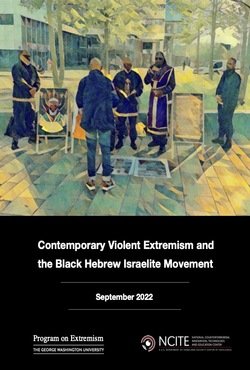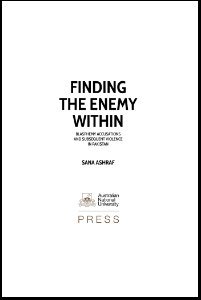By George Washington University, Program on Extremism
This report evaluates violent extremism inspired by or connected to the Black Hebrew Israelite (BHI) movement. Black Hebrew Israelites ascribe to the idea that modern-day African Americans are the descendants of the Israelites in the Old Testament of the Bible. However, an extremist fringe within the movement takes this idea one step further, arguing that white Europeans are the descendants of Satan and that white Jews are impostors. Situating the role of extremist interpretations of BHI ideology within domestic violent extremist incidents during the past several years, this report finds: ● Like other domestic violent extremist movements in the contemporary American landscape, Black Hebrew Israelite violent extremism has undergone a transformation over the past twenty years. The predominant threat today is from individuals loosely affiliated with or inspired by the movement rather than by groups, organizations, or institutions. ● Today’s violent extremists with a nexus to Black Hebrew Israelite extremism are usually not formal participants in any Black Hebrew Israelite organization, church, or group. They usually interpolate aspects of Black Hebrew Israelite ideology—particularly the idea that white Jews are impostors—into a personally-curated mix of viewpoints and ideologies that inspire violence. ● Despite ongoing controversy about how to classify domestic violent extremists who are motivated by racial ideologies but are not white supremacists, the “racially and ethnically motivated violent extremism” (RMVE) category used by federal law enforcement in the U.S. remains an apt descriptor for Black Hebrew Israelite violent extremists. ● Using the RMVE label for Black Hebrew Israelites yields important comparisons between this movement and other RMVE actors, particularly white supremacist violent extremists. Notably, Black Hebrew Israelite violent extremists and their white supremacist counterparts often share similar ideologies and core conspiracy theories, are examples of the role of religious ideas in domestic violent extremist movements, and often choose similar targets for attacks due to their mutual anti-Semitism.
Washington, DC: George Washington University, Program on Extremism, 2022. 21p.











